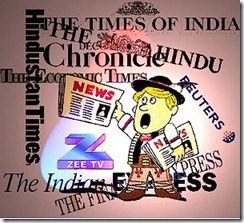 New Delhi, Dec 29 : The media in India has gone far in pursuit of commercialization, ignoring the hurdles faced by journalists in the North-east and Jammu and Kashmir, amidst insurgencies and allegation of human right abuses.
New Delhi, Dec 29 : The media in India has gone far in pursuit of commercialization, ignoring the hurdles faced by journalists in the North-east and Jammu and Kashmir, amidst insurgencies and allegation of human right abuses.
At least 19 journalists and one media worker have been killed this year in the region, according to a Review of South Asia.
The report released at a meeting of the South Asia Free Media Association (SAFMA) that was attended by Union Finance Minister, Pranab Mukherjee, former union minister, Mani Shankar Aiyar and BJP leader Yashwant Sinha here today, presented a savoury scenario for newsmen working in South Asia.
The Indian media has gone far in pursuit of commercialism, in the process forgetting, for instance, the real issues that journalists in the north and North-east are facing in the midst of insurgencies and human rights abuses by the security forces. Indeed, a powerful corporate culture has almost isolated and blacked out those real heroes, who are still facing censorship and death threats by state and non-state actors, the report said.
In India, the media has always been vibrant although a little vulnerable to nationalism, but it was by and large free of unethical conduct. On the other hand, unrest and turmoil in certain regions has exposed journalists to violence and there have been casualties, which could be avoided, if the state would refuse to allow impunity to powerful elements.
The Media Commission, India, expressed shock and anguish at the Radia tape disclosures and suggested certain remedial measures.
In Afghanistan the news media Persons were vulnerable to conditions of mis-governance and terrorism, and was presided over by a government not yet ready to show a sense of responsibility to the function of accountability performed by the mainly donor-funded ‘free’ media.
In Bhutan and Maldives, journalism is passing through a phase of rudimentary development, but with a clear promise to sink roots which can supplement institutions that stand for responsibility and accountability. In the case of Nepal and Sri Lanka, where the media is more firmly established, conditions of rebellion and authoritarianism severely curtailed its ability to face up to the odds facing any journalist devoted to the function of honest reporting.
The Bangladeshi media has been described as bipartisan as the political system itself, which was seen by many, as a polarisation of an institution that should be committed to non-partisan scrutiny of the political scene.







0 comments:
Post a Comment